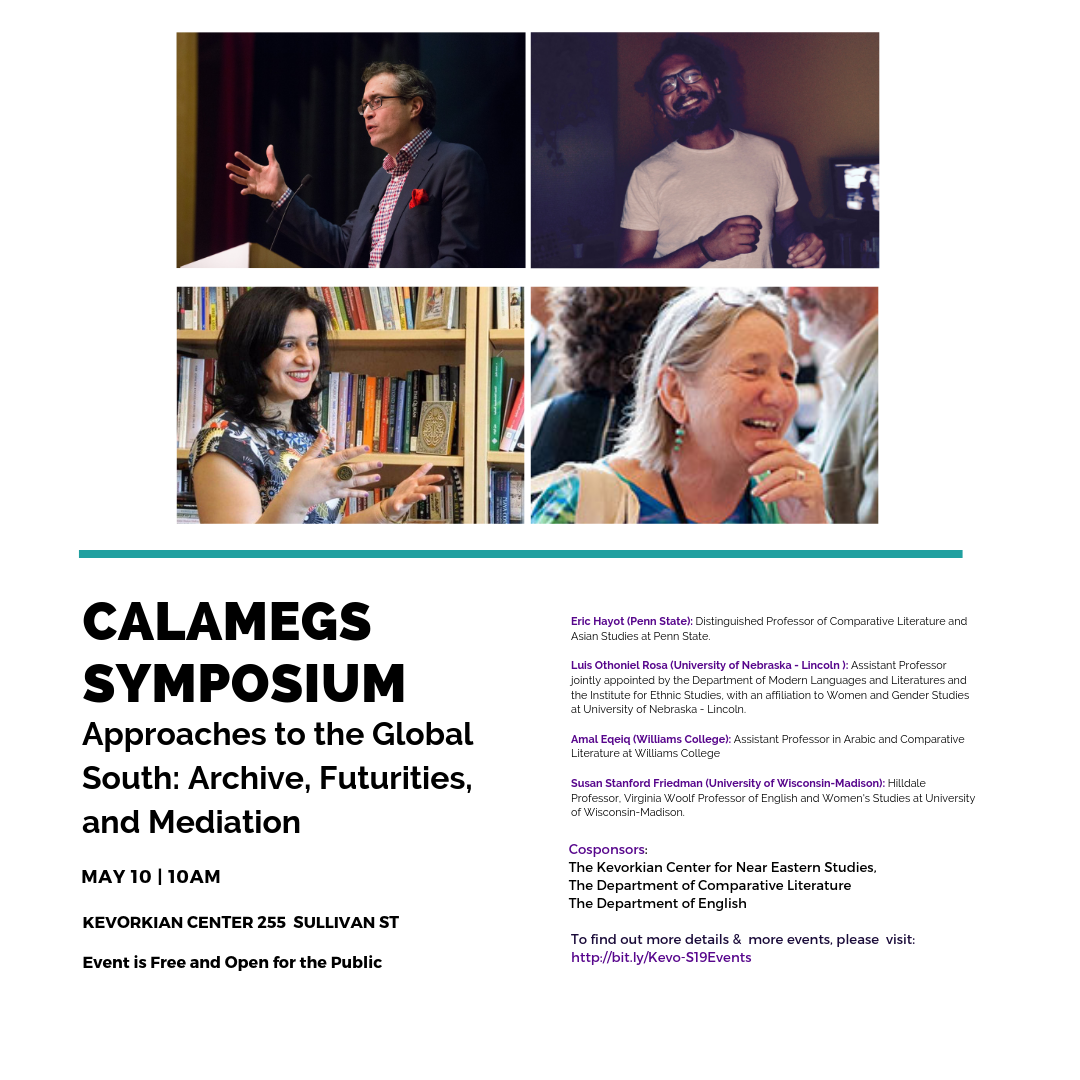It’s interesting to see how the South helps focus on the politics of knowledge in US academic circles.  Source: CALAMEGS SYMPOSIUM // Approaches to the Global South: Archives, Futurities, and Mediation
Source: CALAMEGS SYMPOSIUM // Approaches to the Global South: Archives, Futurities, and Mediation
Category Archives: News
Big Data from the South: The beginning of a conversation we must have – DATACTIVE
how does datafication unfold in countries with fragile democracies, flimsy economies, impending poverty? Is our conceptual and methodological toolbox able to capture and to understand the dark developments and the amazing creativity emerging at the periphery of the empire?
Source: Big Data from the South: The beginning of a conversation we must have – DATACTIVE
Happening Now – Seniman Coffee
“Being served a coffee by a barista who actually processed their green beans is vastly different than being served a coffee that is just well… well- made.” A fascinating “southern perspective” on the world of coffee today.
Source: Happening Now – Seniman Coffee
Critical Times – A new journal
Critical Times seeks to reflect upon and enact forms of transnational solidarity that draw upon critical theory and political practice from various world regions, calling into question hemispheric epistemologies in order to revitalize left critical thought for these times. Critical Times is under the editorship of Juan Obarrio.
Editorial Statement | Decolonising Design
A new network has emerged out of the discipline of design research to further the goal of southern thinking in how we create and manage our worlds.
We welcome all of those who work silently and surely on the edges and outskirts of the discipline to join and contribute to conversations that question and critique the politics of design practice today, where we can discuss strategies and tactics through which to engage with more mainstream discourse, and where we can collectively postulate alternatives and reformulations of contemporary practice.
The ‘Ideas Boom’, or the End of the University?
What ‘Innovation’, ‘Business Improvement’ and Corporatisation mean for the future of Higher Education
April 14 @ 6:30 pm – 8:00 pm
Speakers:
Philip Morrissey, Lauren Bliss, Giles Fielke, Leo Seward and Simon Cooper
New book series ‘Decoloniality’
In fall 2015, we created a new book series on Decoloniality, which was supported with conference panels and mini-conferences in 2015 and 2016.
We want to take this opportunity to invite book proposals from this community by officially announcing the launch of this new book series DECOLONIAL OPTIONS FOR THE SOCIAL SCIENCES. Information about the series, which is published with Lexington/Rowman, can be found at our web-site, which will also increasingly be used to publish additional content: https://decolonialsocialscience.wordpress.com/
ABOUT THE SERIES
More than being just an ‘emerging paradigm’, decoloniality is a troubling and troubled conversation that does more than just cross the boundaries of disciplines, geo-polities, time frames, cultures, and identities. Interrogating the acts and gestures of crossing borders as events that simultaneously also make borders, decolonial perspectives have opened the possibility for border thinking and border existences that challenge the social sciences at their core.
The book series seeks proposals that consider in all aspects the gesture of sociological delinking from the coloniality of power, being, knowledge and life itself. All contributions should aim to consider themselves as interventions to answer this challenge: “Projects aimed at ‘ decoloniality ,’ understood as the simultaneous and continuous processes of transformation and creation, the construction of radically distinct social imaginaries, conditions, and relations of power, knowledge.” Our main aim with series is to consider, discuss, and develop ideas and questions that represent an epistemic de-linking that challenges sociology.
A SERIES EDITED BY : Alexander I. Stingl (IAM FAU Erlangen – Nürnberg), Oyeronke Oyewumi (Stony Brook), Nicholas Rowland (Penn State), and Sabrina M. Weiss (RIT)
The series is co-supervised by an editorial advisory board, comprised of both well-established senior researchers and promising junior scholars from all over globe.
Alexander Stingl serves as corresponding editor and can be reach via email at nomadicscholarship@gmail.com
Here’s one way to recover and protect Africa’s ‘lost science’

The rise of SciELO open source access academic journals in the South.
Source: Here’s one way to recover and protect Africa’s ‘lost science’
Eduardo Galeano’s Words Walk the Streets of a Continent
Eduardo Galeano’s Words Walk the Streets of a Continent. A tribute to one of the South’s most powerful voices who recently passed away at 74 years of age.
On the dangers of ‘reverse essentialism’
While Southern Theory continues to grow, there is a danger that it develops insulated from critique. There is the risk that its political mission focuses exclusively on distinguishing a separate form of knowledge from the dominant north, repeating the kind of denial of southern roots prevalent in the North.
A recent article by Gregor McLennan from University of Bristol offers a critical appreciation of Southern Theory:
Sociology is often pitched as the social science discipline most obviously in need of postcolonial deconstruction, owing to its ostensibly more transparent Eurocentrism as a formation. For this reason, even postcolonial scholars working within the ambit of sociology are reluctant to play up its analytical strengths in addition to exposing its ideological deficits. Without underestimating the profound impact of the growing body of postcolonial theorizing and research on self-reflexivity within sociology, this paper points up some key ways in which the structure of comprehension within postcolonial critique itself is characteristically sociological. Alternatively, if that latter conclusion is to remain in dispute, a number of core epistemological and socio-theoretical problems must be accepted as being, still, radically unresolved. Consequently, a more dialectical grasp of sociology’s role within this domain of enquiry and style of intellectual politics is needed. I develop these considerations by critically engaging with three recent currents of postcolonial critique – Raewyn Connell’s advocacy of “Southern Theory”; the project of “reinventing social emancipation” articulated by Boaventura de Sousa Santos; and the “de-colonial option” fronted by Walter D. Mignolo.
He cites Santos’ caution against a simplistic North-South binary:
[Santos’] accepts that the register of South versus North, East versus West is a metaphorical one that, while effective as a ‘‘defamiliarizing’’ tactic, runs the risk of a sloppy reverse essentialism in which Europe and its traditions are treated as a ‘‘monolithic entity’’.
We are left with a challenging question. If we accept that the North-South division is indeed a generalisation, then what is its remaining meaning? It is possible to lay a similar charge with many oppositions, such as male-female, human-nature and capital-labour. The criticism doesn’t invalidate the opposition, but does caution against an essentialist reading of geopolitics. The opposition needs to be understood as a ongoing construction that is critically relevant to cultural trajectories, rather than something that occurs automatically when we cross the equator.
Reference
Gregor McLennan (2013), Postcolonial Critique: The Necessity of Sociology, in Julian Go (ed.) Postcolonial Sociology (Political Power and Social Theory, Volume 24), Emerald Group Publishing Limited, pp.119-144
